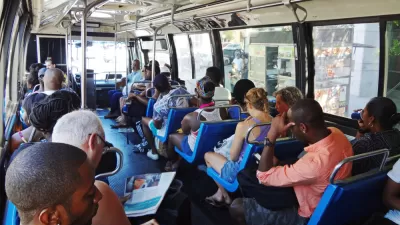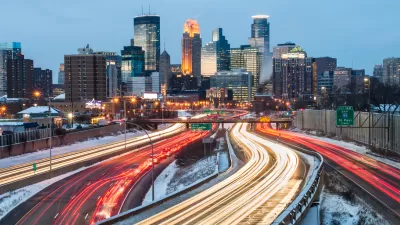The three very different stories of the building trades in Atlanta, Denver, and Portland show just how much urban development patterns affect workers.
By Greg LeRoy
Some of the most conservative members of the labor movement—the building trades—are learning that howcities grow really matters. The lessons they are learning are a common-ground road map between labor, environmentalists, and advocates for urban justice.
Activists have long understood that some union members see the value of smart growth. The Food & Commercial Workers oppose new Walmarts, for example, and the Amalgamated Transit Union supports coalitions to protect and expand transit service. But connections have been less common with the building trades—the unionized electricians, carpenters, laborers, plumbers, sheet metal workers and other skilled workers who construct our built environment.
Indeed, some people might assume that sprawl doesn’t matter to the trades because it involves construction. But actually, sprawl has been a disaster for the trades; anti-union contractors penetrate markets from the outside in, the same way Walmart invaded communities where small neighborhood businesses once thrived.
Race has also been central to the story. As sprawl’s white flight caused central cities and inner-ring suburbs to become majority-minority, some trades failed to recruit and organize many workers of color, weakening them in many ways. Higher rates of unionization benefit all workers in an industry; and in construction specifically, joint union-management apprenticeship programs have consistently done better than non-union programs in recruiting, graduating and placing workers of color and women.
Now, thanks to some exceptionally honest and self-critical building trades leaders, we can present the history of three metro areas that lay out these dynamics in vivid detail. If “union density” means the share of work performed by union members, the trades are learning to recite grocery and transit workers’ mantra: “Urban density is good for union density.”
Atlanta: Suburbanization Shrinks the Trades Down to "the Alamo"
In 1989, Charlie Key, a plumber and then-business manager of the North Georgia Building & Construction trades Council, gave a cautionary speech about the trades’ catastrophic loss of density in Atlanta. Things were already so bad, Key said, that there was only one totally union construction project underway in the region. “We made all the classic mistakes. We ignored public opinion. We ignored our political base. We ignored the residential and small jobs. We ignored the small towns and suburbs. We ignored a growing black population.”
There was a clear geographic dimension to his story...
FULL STORY: Sprawl vs. Unions

Maui's Vacation Rental Debate Turns Ugly
Verbal attacks, misinformation campaigns and fistfights plague a high-stakes debate to convert thousands of vacation rentals into long-term housing.

Planetizen Federal Action Tracker
A weekly monitor of how Trump’s orders and actions are impacting planners and planning in America.

San Francisco Suspends Traffic Calming Amidst Record Deaths
Citing “a challenging fiscal landscape,” the city will cease the program on the heels of 42 traffic deaths, including 24 pedestrians.

Defunct Pittsburgh Power Plant to Become Residential Tower
A decommissioned steam heat plant will be redeveloped into almost 100 affordable housing units.

Trump Prompts Restructuring of Transportation Research Board in “Unprecedented Overreach”
The TRB has eliminated more than half of its committees including those focused on climate, equity, and cities.

Amtrak Rolls Out New Orleans to Alabama “Mardi Gras” Train
The new service will operate morning and evening departures between Mobile and New Orleans.
Urban Design for Planners 1: Software Tools
This six-course series explores essential urban design concepts using open source software and equips planners with the tools they need to participate fully in the urban design process.
Planning for Universal Design
Learn the tools for implementing Universal Design in planning regulations.
Heyer Gruel & Associates PA
JM Goldson LLC
Custer County Colorado
City of Camden Redevelopment Agency
City of Astoria
Transportation Research & Education Center (TREC) at Portland State University
Jefferson Parish Government
Camden Redevelopment Agency
City of Claremont





























